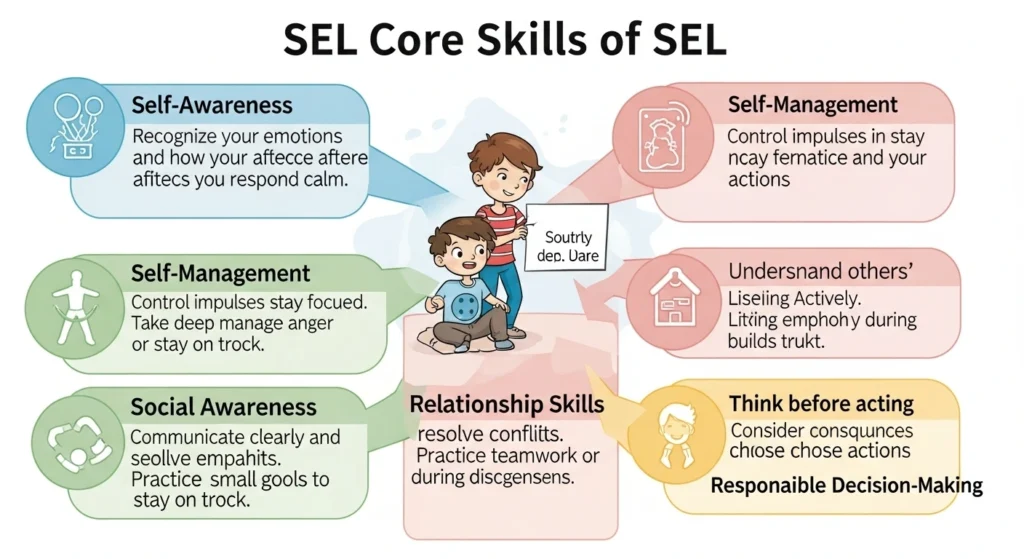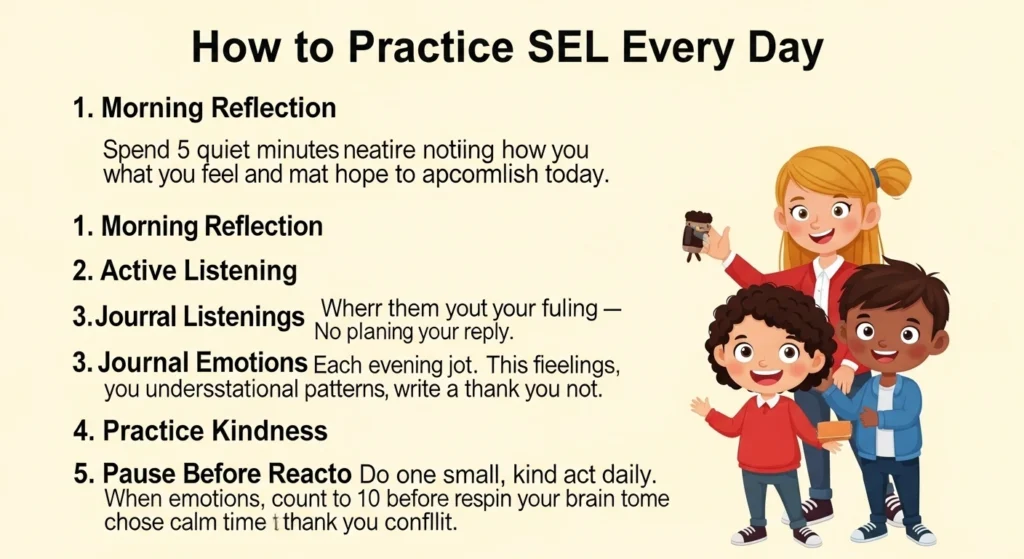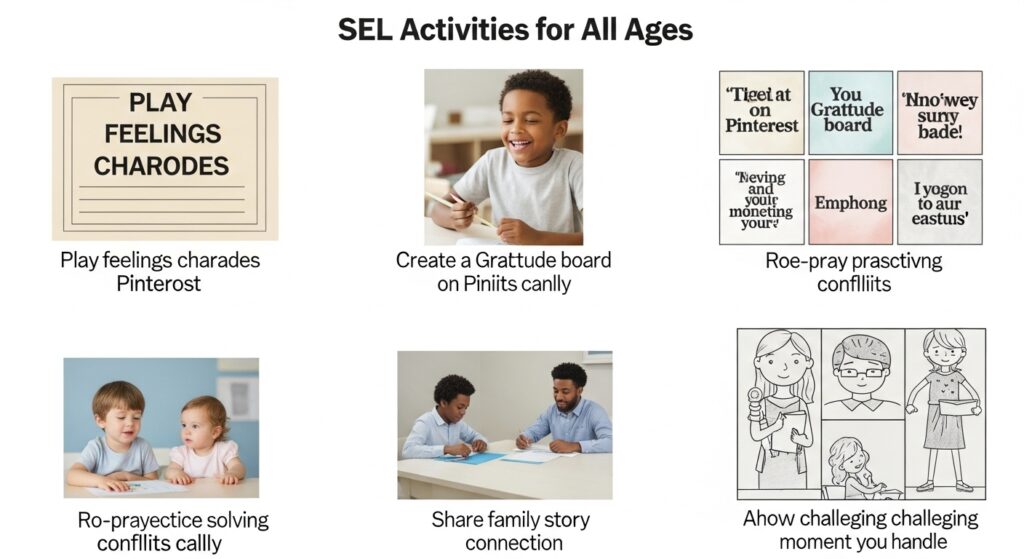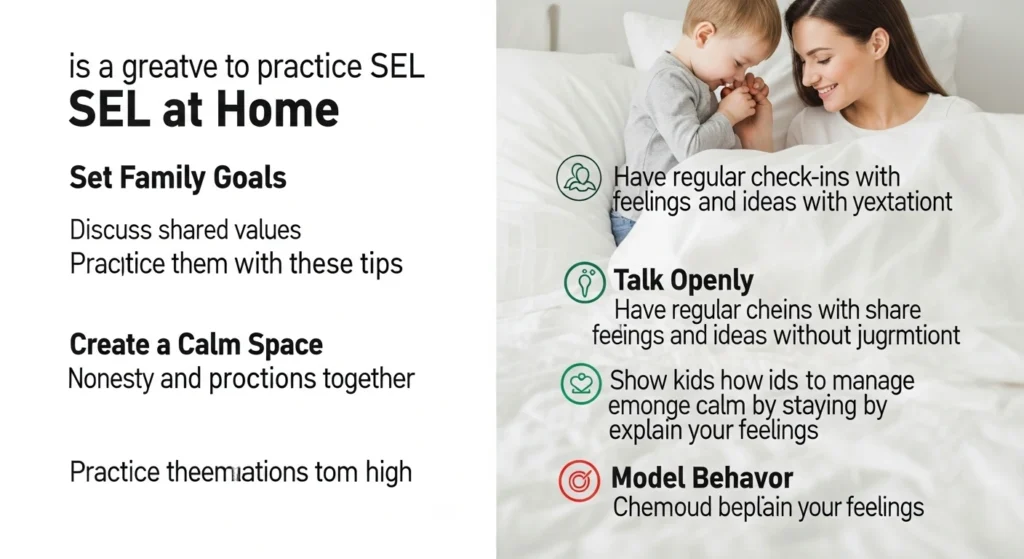Social Emotional Learning: Build Stronger Connections Daily
Social emotional learning (SEL) helps people understand and manage emotions, build relationships, and make thoughtful choices. It’s a way to grow personally and connect better with others. This guide is for Pinterest users in Europe and America who want practical ways to embrace SEL in everyday life.
What Is Social Emotional Learning?
SEL is about developing skills to handle emotions, set goals, and get along with others. It includes self-awareness, empathy, and decision-making. By practicing SEL, you can improve your mental well-being and create stronger bonds with family, friends, or coworkers.
Why SEL Matters
SEL equips you to navigate life’s ups and downs. It reduces stress, boosts confidence, and helps you communicate clearly. For kids and adults alike, SEL fosters kindness and resilience, making daily interactions more positive and meaningful.
Benefits of Social Emotional Learning
| Benefit | Description |
|---|---|
| Better Relationships | Empathy and communication strengthen connections. |
| Less Stress | Understanding emotions helps you stay calm under pressure. |
| Improved Decisions | SEL encourages thoughtful choices over impulsive reactions. |
| Greater Confidence | Self-awareness builds trust in your abilities. |
Core Skills of SEL
SEL focuses on five key areas. Each one helps you grow emotionally and socially:
- Self-Awareness: Recognize your emotions and how they affect your actions. For example, noticing when you’re frustrated can help you respond calmly.
- Self-Management: Control impulses and stay focused. Take deep breaths to manage anger or set small goals to stay on track.
- Social Awareness: Understand others’ feelings. Listening actively shows empathy and builds trust.
- Relationship Skills: Communicate clearly and resolve conflicts. Practice teamwork or compromise during disagreements.
- Responsible Decision-Making: Think before acting. Consider consequences and choose actions that align with your values.

How to Practice SEL Every Day
You don’t need special training to start SEL. Here are simple ways to weave it into your routine:
- Morning Reflection: Spend 5 minutes thinking about how you feel and what you want to achieve today.
- Active Listening: When someone talks, focus fully on their words without planning your response.
- Journal Emotions: Write down what you feel each evening to understand your emotional patterns.
- Practice Kindness: Do one small act daily, like complimenting a coworker or helping a neighbor.
- Pause Before Reacting: Count to ten when upset to avoid saying something you might regret.

SEL Activities for All Ages
- Play a feelings charades game to identify emotions.
- Create a gratitude board on Pinterest with inspiring quotes.
- Role-play scenarios to practice solving conflicts calmly.
- Share a family story to build empathy and connection.
- Draw or write about a challenging moment and how you handled it.

SEL at Home
Your home is a great place to practice SEL. Create a supportive environment with these tips:
- Set Family Goals: Discuss shared values, like respect or honesty, and practice them together.
- Create a Calm Space: Designate a quiet corner for reflection or relaxation when emotions run high.
- Talk Openly: Have regular check-ins with family to share feelings and ideas without judgment.
- Model Behavior: Show kids how to manage emotions by staying calm and explaining your feelings.

SEL in Social Settings
SEL shines in group interactions. Whether at work, school, or with friends, these habits help:
- Acknowledge others’ perspectives during discussions.
- Offer support when someone seems upset or overwhelmed.
- Use “I” statements, like “I feel frustrated when…” to express yourself clearly.
- Celebrate others’ successes to build a positive community..
Common SEL Misconceptions
Some think SEL is only for kids or overly complex. Let’s clear up a few myths:
| Myth | Truth |
|---|---|
| SEL is just for schools | Adults benefit from SEL in work, home, and social life. |
| It’s too time-consuming | Small daily habits, like deep breathing, make a big impact. |
| You need to be an expert | Anyone can practice SEL with simple, everyday actions. |
Challenges of SEL
SEL takes practice and patience. You might struggle to stay calm during stress or find it hard to empathize with differing views. Start with one skill, like self-awareness, and build from there. If conflicts arise, focus on listening and finding common ground.
SEL and Community Building
SEL strengthens communities by fostering understanding and respect. Volunteer in local groups, join a book club, or start a neighborhood project. These activities build social skills and create a sense of belonging for everyone involved.
Why SEL Is for Everyone
SEL isn’t limited by age or background. Whether you’re a parent, professional, or student, these skills help you thrive. They make tough days easier and good days even better by helping you connect with yourself and others.
Start Your SEL Journey
Ready to try social emotional learning? Pick one activity—like journaling or active listening—and practice it today. Share your ideas on Pinterest to inspire others. Small steps lead to big changes, so start now and enjoy stronger connections and a happier you.


